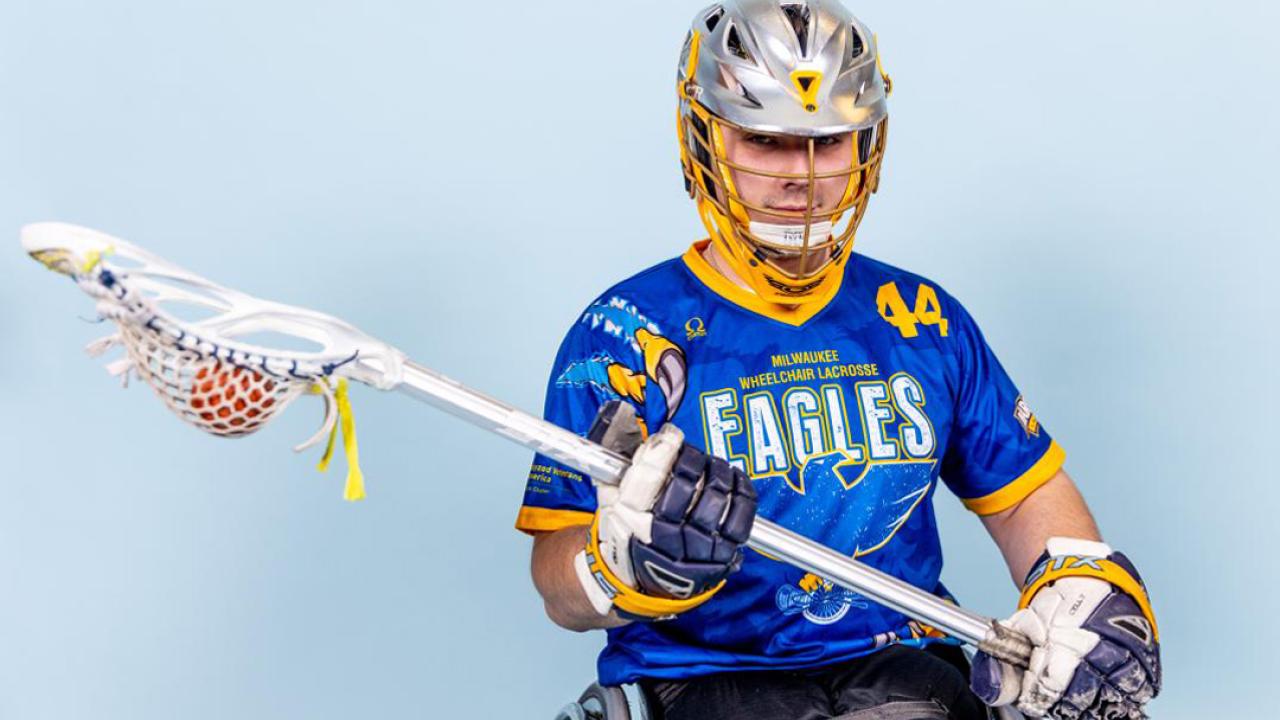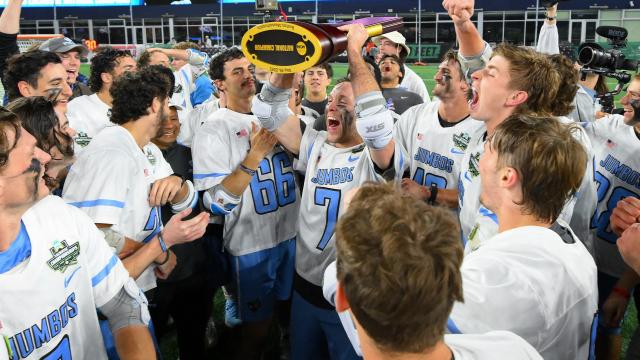
How Milwaukee's Mark Krenz Became a Wheelchair Lacrosse Sensation
Mark Krenz can hear nothing but the AC/DC in his Air Pods as he pushes down the sidewalk on College Avenue toward South Shore Athletic Club.
The ride to the gym is the easiest — a half-mile straight shot, mostly downhill, from his mother’s Milwaukee home to the gym. Unless it’s the dead of winter in Wisconsin’s largest city, where temperatures can hover around zero degrees, Krenz travels to and from the gym in his Top End sports wheelchair at least four days a week. “I just put my headphones in, jump in my chair and go,” Krenz said.
At South Shore Athletic Club, Krenz straps himself to the SciFit Pro2 hand cycle machine, bumping the resistance to 5.5 and cranking his hands in a circular motion for 20 straight minutes —the equivalent of 4.5 miles. After a core workout, he heads downstairs to the basketball court for 90 minutes of taking shots and working on his technique. Then it's a 30-minute push uphill to his mother’s house, where he works on his stick skills to cap the day.
Krenz is the star player for the Milwaukee Eagles, a wheelchair lacrosse team with national championship hopes every season. He trains like it.
“He has the upper-body strength of four people,” said former Marquette lacrosse player Anthony Courcelle, who coached Krenz for the Eagles.
Krenz is the type of athlete who after hours of wheelchair lacrosse training at Marquette Gymnasium stuns his teammates by climbing a military-style rope while attached to his chair.
“Mark will roll up to it after practice — sweaty, tired — and climb up to the top and down with ease,” said Jake Richard, the former Marquette and current U.S. team midfielder who is the defensive coordinator for the Eagles. “He's climbing over the gym floor, but he’s not worried about it because he’s a superman.”
Krenz, 26, has myelomeningocele, a form of spina bifida in which part of the spinal cord and surrounding nerves protrude through open bones in the spine. Born with the condition, he experiences weakness below the waist and malformation in his hips (which he has had replaced on multiple occasions). He has a ventriculoperitoneal shunt to drain excess cerebrospinal fluid from his brain into his abdomen, where his body can remove it.
By his count, Krenz has endured 57 surgeries — including shunt removals, hip and ankle replacements and numerous other procedures.
“If I didn’t have sports, I wouldn’t have the attitude and mindset I have,” he said. “I always felt I deserved to be at the top and just kept going.”
Krenz used crutches until he was in eighth grade, when he got his first wheelchair and joined the Wisconsin Adaptive Sports Association. A five-time wheelchair basketball tournament MVP who competed for internationally for the USA U23 team, the relative newcomer to lacrosse first turned heads in 2018 when he was named Wheelchair Lacrosse USA Nationals MVP.
“I don’t know how he does it,” said his mother, Debbie. “He puts his earbuds in and keeps pushing. It’s a good motto for life. Keep pushing and you get what you give.”
KRENZ SAT NERVOUSLY on the Milwaukee public school bus traveling northbound on 60th Street when a drunk driver plowed into the bright yellow exterior of the vehicle on its way to Fairview Elementary School.
After the collision, Krenz, a fourth-grade student in his first day at a new school, turned to his right and saw a classmate bleeding profusely with glass scattered across his face.
“He was gushing blood from his forehead,” Krenz said. “I got him up and walked him out. I grabbed him on the arm and said, ‘Hey, we have to go. There are people to help us.’”
Krenz helped the boy off the bus and notified the medics, who placed him in the front seat of the ambulance as they pulled away from the scene of the crash. Aaron Latawiec got the ride of his life — and a friend for life.
“Yeah, that’s me,” Latawiec exclaimed. “That’s cool!”
Krenz immediately felt a connection with Latawiec, who has Down syndrome.
“I remember Aaron’s dad calling me to say he was so excited that Aaron found a friend,” Debbie Krenz said. “He invited him over to his pool. He was so thrilled.”
Krenz and Latawiec attended elementary, middle and high school together. Krenz looked after Latawiec. In return, Latawiec became Krenz ’s biggest supporter, both on and off the court. During their 16-year friendship, they have hung out at each other’s homes, traveled to basketball and lacrosse tournaments and shared in life together. Each found a sense of purpose in the other.
“He’s a friend that became family,” Krenz said. “I love having him through this journey.”
When Krenz is not at Fiserv Forum detailing cars for the Milwaukee Bucks (Serge Ibaka's matte gray Mercedes G-Wagon is his favorite job) or hoisting himself up ropes, he’s with Latawiec. They’re popular with the Marquette men’s lacrosse players, who host and work with the Milwaukee Eagles as a service-learning opportunity.
“Marko basically said, ‘I got you, man. You’re part of my life now. Everything I experience, you're going to experience it, too,’” Richard said.
Krenz routinely drives Latawiec around campus and to his training sessions, making sure he doesn’t miss a moment with him. At practices, Latawiec paces the gym floor and roots for Krenz, tossing him a Gatorade bottle when he needs a drink. During games, he wears Krenz’s alternate jersey and cheers.
“If Aaron's not at practice, it's less interesting, to say the least,” Courcelle said. “I can see it in Marko’s face and in our team’s faces. We love having Aaron there.”
“I always scream ‘Go!” when I see him out there,” Latawiec said. “I keep telling him to make more goals.”
Latawiec assists Krenz with physical tasks, carrying his chair and placing it in the trunk of his Jeep after a long day at the gym or simply opening doors for his friend.
“What Mark couldn't do, Aaron could. And what Aaron couldn't understand, Mark could explain to him,” Debbie Krenz said. “This is God. This is magic. There’s no other way that these two have become best friends.”
Krenz and Latawiec reflected on their friendship while watching “Dirty Jobs” one night in January. Sitting on the couch together, they tried to articulate the place each holds in their lives.
“Mark is the greatest kid ever,” Latawiec said. “He tries the hardest. Mark is the greatest player and he’s a good friend, too. I love this guy.”
“He’s the majority of my why,” Krenz said. “I love getting him the spotlight that he deserves.”
KRENZ CIRCLED THE GAME ON HIS CALENDAR — a matchup with the Buffalo Bandits at the 2018 Wheelchair Lacrosse USA Nationals at Wheel Park in Aurora, Colorado.
“I don’t like them, at all,” he said. “They are the kings of smack-talking.”
On a concrete gray court in the shape of an ice rink, Krenz glided through multiple defenders, pick-and-rolled to the net, threw several head fakes that got the defense spinning its wheels in the wrong direction and slotted the ball stick-side low into the back of the cage to score the first of his nine goals on a 90-degree day in late August. Milwaukee defeated Buffalo 14-1.
Although the Eagles couldn’t advance to the championship game, Krenz was honored as the tournament’s most valuable player at the closing banquet in Denver. He received a certificate with his name on it and a USA Lacrosse backpack. He brought Latawiec on stage with him.
“I gave Aaron the backpack and held up the certificate with him and took pictures,” Krenz said. “Every time I do something crazy or have a good game, it means the world that I get to do it for these guys and the coaches, just because of the people that they are. They love the game, too.”
Krenz has played wheelchair lacrosse for about eight years. His first sport was golf, then he found basketball through the Wisconsin Adaptive Sports Association. He played wheelchair basketball at UW-Milwaukee but wanted a new challenge.
Debbie Krenz found out about the Milwaukee Eagles. Led by Dr. Kenneth Lee, the program perennially sends teams to wheelchair nationals and has fostered long-term relationships across Milwaukee.
Krenz found a sport that was even more physical than basketball, and he gravitated to it immediately.
“Even when I got home from practice, I didn't want to put it down,” he said. “I had a spare room set up in my dad's house with a mattress that we weren't using. I drew targets on it with a tennis ball, and I would play a wall ball across this spare room in my house, working on my accuracy and my shooting."
At age 20, Krenz was the fastest player on the court. He had a killer instinct.
“I want my matchup to quit,” he said. “That’s how I work.”
Those watching Krenz as he developed within the Eagles program saw rapid progress. Most had never seen a wheelchair lacrosse player operate at such a high level.
“He’s so hard to cover. He's very slick,” Courcelle said. “He explodes in and out of his dodges. His spirit has only gotten stronger since I've known him. What he does is so rare.”
“Dodging is extremely difficult in wheelchair lacrosse. Marko has the ability to weave through defenders while somehow still accelerating and protecting the ball,” said Shawn Maloney, a USA Lacrosse regional manager who plays and coaches for the Colorado Rolling Mammoth. “More impressively, he is an intense competitor who covers every inch of the floor. He’s pushing the boundaries of the sport and challenging the rest of us to get better in the process.”
Krenz’s upper body strength allows him to maneuver his chair using both hands while maintaining control of the ball. He can score from either side. His signature head fake lures defenders the wrong way and creates space to shoot.
“They fully bite on it, their chairs turn and I’m gone,” he said. “Then, it’s pump fake and fire.”
Krenz, who also organizes and coaches youth wheelchair basketball clinics, says lacrosse has deepened his connection to the community.
“I'm so thankful for sports to be my outlet because the time thinking, ‘I don't want to do this. I’m tired. How am I going to take care of myself?’ is more than cut in half,” he said. “Lacrosse has given me common ground with others with crazy complicated stories, growing up and overcoming adversity.”
Krenz knows that challenges lie ahead as he continues to live with spina bifida — more trips to the hospital, more times stuck at a 30-degree angle to let his hip heal and more trips to the sideline to catch his breath. He’s equipped to go with the grain, never taking his life and the people in it for granted. Determined to be the best son, brother, teammate and friend.
“Whatever needs to get done, it will be done,” Debbie Krenz said. “He’s going to have peaks and valleys in his life, but right now he has had great moments in lacrosse. Mark just keeps pushing forward.”
Matt Hamilton
Matt Hamilton is the Content Marketing Manager at USA Lacrosse, having served as a staff writer for four years. He's a Baltimore native who loves the Orioles and Ravens, even if they let him down in the last year. He likes chicken tenders and Shirley Temples and sick views. He also loves writing about lacrosse.

Related Articles





